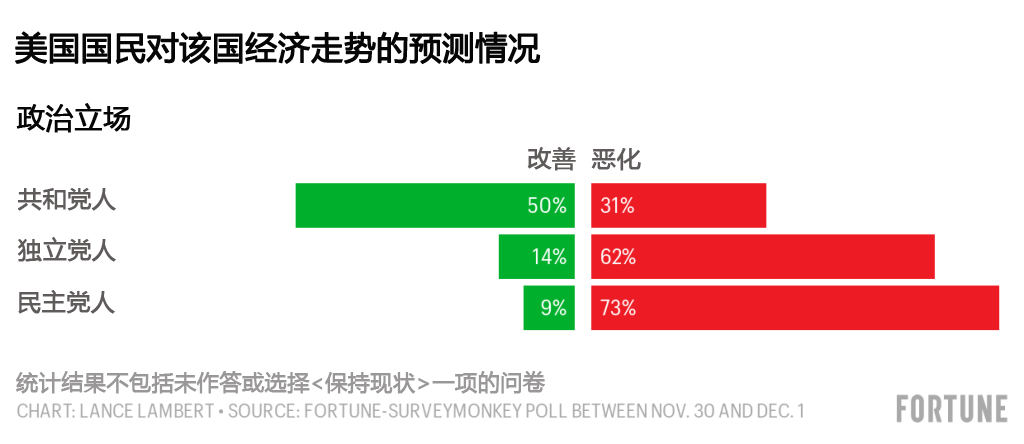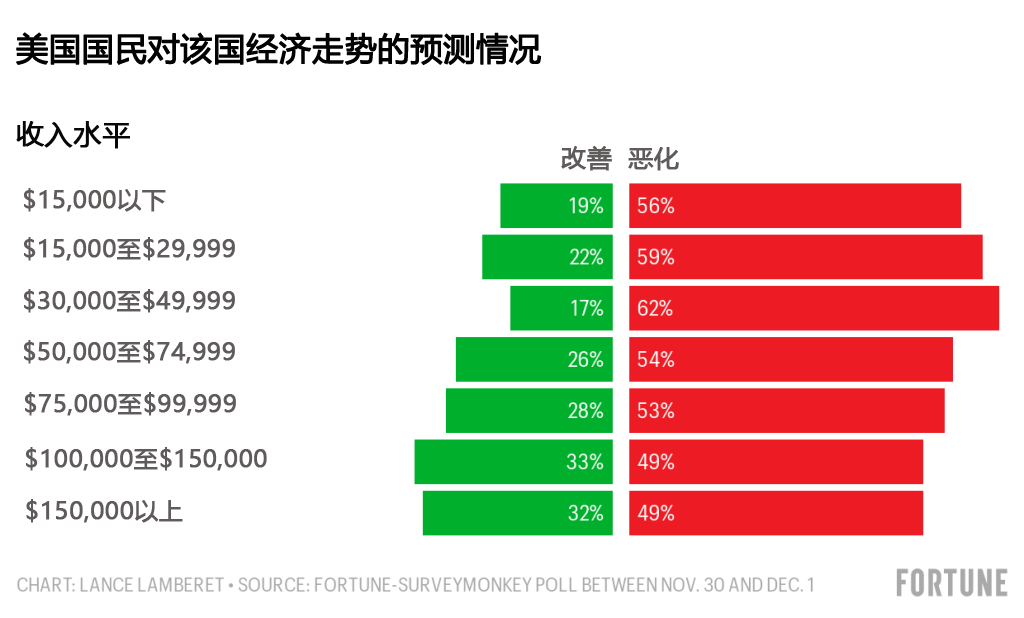早在今年夏季美国经济数据从最低点一路回升之时,所谓的“V字型回升”便引发了热议。如今的美国已进入隆冬,疫苗虽在陆续上市却仍未广泛铺开,美国人似乎对经济发展方向信心不足,多数人认为情况正变得越来越糟。
《财富》和Surveymonkey于11月30日至12月1日期间发布的一项民意调查显示,超过半数(54%)美国人认为国家经济形势正在恶化,高于8月时的52%。
然而,每个个体对经济的看法各不相同,仍有26%的受访者认为经济正在改善。共和党人所持观点与民主党人形成鲜明对比:约有50%的共和党人看好经济态势,这一比例在民主党人中只占9%。值得注意的是,共和党人在大选前就普遍对经济持乐观态度,8月31日至9月1日期间调查中,62%的人认为经济会走好。

在各收入阶层中,半数人都认为经济正在走衰。

美国疫情自爆发至今已超逾十个月,各方面经济悉数受到沉重打击,国内悲观情绪弥漫。
唯一令人欣慰的是,美国实际的经济反弹情况明显好于经济学家及分析师的预期,零售支出和失业率等关键数据也在继续改善,不过近几个月的改善速度明显放缓。12月4日美国最新失业报告显示,该国11月增加了24.5万个工作岗位,失业率从6.9%略微降至6.7%。
“复苏虽失去了一些源动力,但仍在继续。”美国银行经济主管米歇尔•迈耶近期对《财富》表示。
亦有一些经济学家坚持认为当前美国经济必须有额外的动力推进才能免于停滞。若国会不能在12月26日出台新救助计划,届时将有约1,300万人无法继续获得失业救济金,数百万人可能在明年1月遭到驱逐。
穆迪(Moody)首席经济学家马克•赞迪接受《财富》采访时强调,“如果救助计划破灭,最近失业报告无疑暗示着我们的经济将开始倒退,大量员工再次失业,失业率将重新回升。” 他认为,新一轮经济刺激计划的“难产”很有可能会导致美国经济“二次衰退”。
尽管美国国会已临近谈判最后期限,但曙光尚未完全到来。12月5日至10日期间,美国申请失业救济金人数由上周的71.6万人次上升至83.5万人次,远超预期。(财富中文网)
《财富》与Surveymonkey于11月30日至12月1日期间对2247名美国成年人进行了调查,容差幅度为±3个百分点。
编译:陈怡轩
早在今年夏季美国经济数据从最低点一路回升之时,所谓的“V字型回升”便引发了热议。如今的美国已进入隆冬,疫苗虽在陆续上市却仍未广泛铺开,美国人似乎对经济发展方向信心不足,多数人认为情况正变得越来越糟。
《财富》和Surveymonkey于11月30日至12月1日期间发布的一项民意调查显示,超过半数(54%)美国人认为国家经济形势正在恶化,高于8月时的52%。
然而,每个个体对经济的看法各不相同,仍有26%的受访者认为经济正在改善。共和党人所持观点与民主党人形成鲜明对比:约有50%的共和党人看好经济态势,这一比例在民主党人中只占9%。值得注意的是,共和党人在大选前就普遍对经济持乐观态度,8月31日至9月1日期间调查中,62%的人认为经济会走好。
在各收入阶层中,半数人都认为经济正在走衰。
美国疫情自爆发至今已超逾十个月,各方面经济悉数受到沉重打击,国内悲观情绪弥漫。
唯一令人欣慰的是,美国实际的经济反弹情况明显好于经济学家及分析师的预期,零售支出和失业率等关键数据也在继续改善,不过近几个月的改善速度明显放缓。12月4日美国最新失业报告显示,该国11月增加了24.5万个工作岗位,失业率从6.9%略微降至6.7%。
“复苏虽失去了一些源动力,但仍在继续。”美国银行经济主管米歇尔•迈耶近期对《财富》表示。
亦有一些经济学家坚持认为当前美国经济必须有额外的动力推进才能免于停滞。若国会不能在12月26日出台新救助计划,届时将有约1,300万人无法继续获得失业救济金,数百万人可能在明年1月遭到驱逐。
穆迪(Moody)首席经济学家马克•赞迪接受《财富》采访时强调,“如果救助计划破灭,最近失业报告无疑暗示着我们的经济将开始倒退,大量员工再次失业,失业率将重新回升。” 他认为,新一轮经济刺激计划的“难产”很有可能会导致美国经济“二次衰退”。
尽管美国国会已临近谈判最后期限,但曙光尚未完全到来。12月5日至10日期间,美国申请失业救济金人数由上周的71.6万人次上升至83.5万人次,远超预期。(财富中文网)
《财富》与Surveymonkey于11月30日至12月1日期间对2247名美国成年人进行了调查,容差幅度为±3个百分点。
编译:陈怡轩
There was talk aplenty about a so-called "V-shaped" recovery back in the summer when economic data was skyrocketing off of the lows earlier this year. Now, as the U.S. heads into a winter with a new but not yet widely-distributed vaccine, Americans appear less confident that the economy is heading in the right direction: In fact, the majority think things are getting worse.
According to a recent Fortune-SurveyMonkey poll conducted between Nov. 30 and Dec. 1, over half (54%) believe the current national economic situation is worsening, up from 52% in August.
However, much as the narratives on the economy themselves have been varied, some 26% of Americans polled think the economy is improving. And among those who identify as Republicans and Democrats, the contrast was stark: 50% of Republicans believed the economy was improving, versus only 9% of Democrats. Notably, though, Republicans were much more bullish on the economy before the election, when 62% of those polled between Aug. 31 and Sept. 1 thought the economy was improving.
Among income levels, meanwhile, at least roughly half of all income groups believed the economy was headed down the wrong path.
Nearly ten months into a pandemic that's wreaked havoc on the U.S. economy, it's not hard to understand why many Americans have a gloomy outlook.
To be sure, the economic rebound was better than many economists and analysts expected, and key data points like retail spending and the unemployment rate have continued to improve, albeit at a much slower pace in recent months. The most recent unemployment report on Dec. 4 showed that only 245,000 jobs were added in November, dropping the unemployment rate slightly to 6.7% from 6.9%.
"The recovery has lost some momentum, but it has continued," Michelle Meyer, head of U.S. economics at Bank of America, recently told Fortune.
But at the current juncture, the recovery is starting to stagnate and needs an extra push to continue or risk a further decline, some economists argue. Roughly 13 million people are due to lose pandemic unemployment benefits on Dec. 26 without another relief package to extend them, and millions may be vulnerable to evictions in January.
"If we don’t get that help, [the recent unemployment] report suggests that the economy is going to start backtracking, we're going to start losing jobs, and unemployment will start rising again," Moody's chief economist Mark Zandi recently told Fortune. In fact, he argues without additional relief from Congress, "There’s a pretty good chance this will go down in history as a double-dip recession."
That relief, though, has yet to materialize, even as Congress nears a deadline to pass a bill. And on Dec. 10, weekly jobless claims for the week ending Dec. 5 rose to 835,000 from 716,000 the week prior—higher than anticipated.
Fortune-SurveyMonkey polled 2,247 U.S. adults between Nov. 30 to Dec. 1. The margin of error is 3 percentage points.






